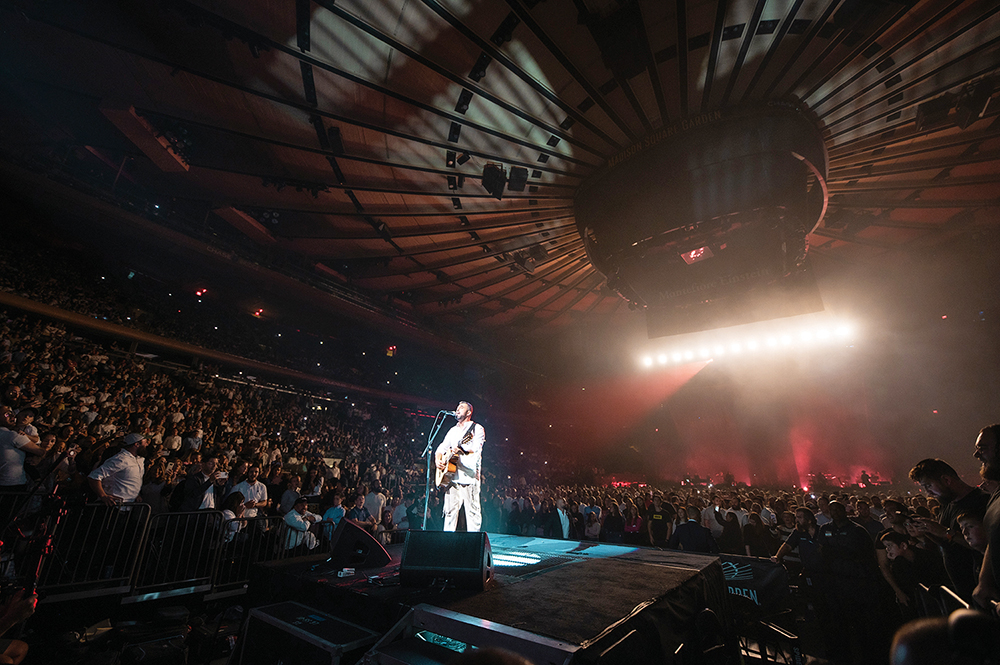
Baruch Shem Kevod Malchuto L’olam Va’ed. Blessed is the name of His glorious kingdom forever and ever.
Just last week, Ishay Ribo, the Orthodox Israeli poet and singer performed his songs of tefilah to a sold out show at Madison Square Garden, organized by Bnei Akiva. 15,000 Jews of all stripes came to hear Ishay’s soulful music, most of which comes directly from the siddur and Torah. It was an inspiring performance that featured collaborations with other Jewish musical legends like Avraham Fried, Akiva and secular Israeli superstar Amir Dadon, showcasing how Ishay makes spirituality accessible at every level. As Ishay said back in 2019, “My music has reached the broadest audience possible, [including] complete atheists who write to me and say, ‘I don’t believe in anything, but your songs awaken something in my soul.”
During his song, Seder HaAvodah, Ishay – dressed in all white – reached the crescendo and sang out with a chorus of 15,000 Jews: ‘Baruch Shem Kevod Malchuto L’olam Va’ed!’ It was an extraordinary moment of love and unity: men with peot (sidelocks) and black velvet kippot and those with no kippah at all, screaming out, ‘Blessed is the name of His glorious kingdom forever and ever!’ To see this unfold, and to see it happen on a stage better known for the likes of Billy Joel and Phish than for a demonstration of mass prayer, was a holy moment, a tacit expression that despite our differences, the Jewish people can still find common ground in our spirituality.
These six words, which Jews across the world will utter in unison on Yom Kippur, are the climax of Musaf on the Day of Atonement. Commemorating the proclamation made by thousands standing in the Beit HaMikdash courtyard following the Kohen Gadol’s avodah, the phrase, while simple in construction, is one of the most profound moments of the entire Yom Kippur service.
Strangely, the loud, animated way we say the phrase on Yom Kippur differs significantly from the two instances when we most frequently say it during the year: at the beginning of Kriyat Shema and when accidentally saying Shem Hashem in vain, both quiet moments shared between an individual and Hashem. What is significant about Yom Kippur that merits this vocal approach to the phrase and what can it teach us as we head into the Yamim Noraim?
I believe the experience at Ishay’s concert can explain the difference. When we say Kriyat Shema or mistakenly say the wrong bracha, it is a private moment, an opportunity to convene with Hashem as individuals, either to express our love or to admit wrongdoing. On Yom Kippur, however, it represents our connection to Hashem as a people, as a nation dedicated to bringing light into the world, making the mundane holy and the profane G-dly. The idea is simple, but powerful, giving the Jewish people a purpose greater than themselves.
For Bnei Akiva, this dedication sits at the core of our mission. Throughout the year, our educators and youth leaders are on the ground – in communities, camps, and yes, even world famous sports arenas, teaching the values of Am Yisrael, Eretz Yisrael, and Torat Yisrael. We have spent decades honing our craft and using experiential methods to imbue the next generation of Jewish children with a love for their people and a deep-rooted devotion to their country, all underpinned by a rigorous commitment to a Torah lifestyle and values. We wholeheartedly believe in the redemptive power of Eretz Yisrael which, among countless other miracles, nurtures and empowers artists like Ishay to bring his holy message to the masses. Bringing thousands of Jews together for Ishay’s inspiring, prayer-filled evening is how we prepare for the chagim; by elevating the heart and soul of every Jew.
As we head into the Yamim Noraim, we should keep the lesson of a loud ‘Baruch Shem Kevod Malchuto L’olam Va’ed’ in mind, with an understanding that only when we can truly feel like one holy nation, united by a shared purpose, will we merit the forgiveness we so desperately seek.
Rabbi Shaul Feldman is the executive director of Bnei Akiva of the US & Canada.












